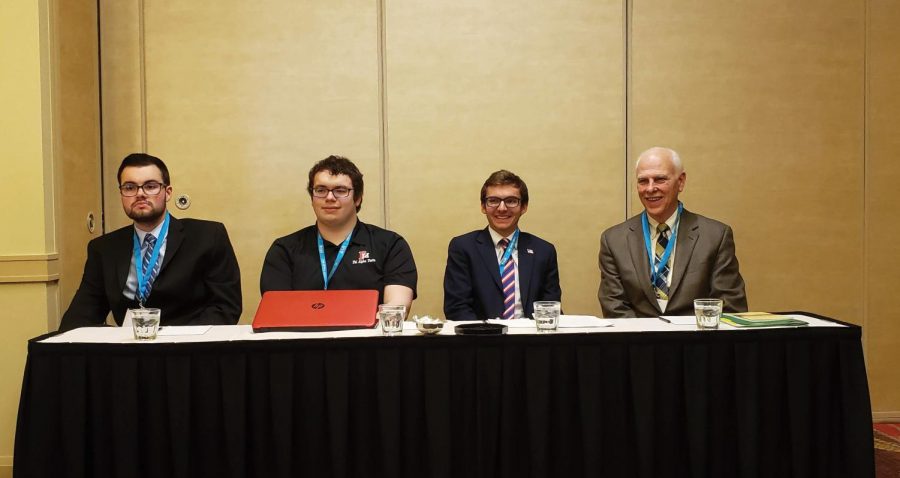PAT presents research at convention
Photo by: James McCarley
From left to right: Micheal Krasuski, Tyler Zeh, Samuel Day and Stephen Carls from different universities participate in a panel.
FMU sent six students to the Phi Alpha Theta (PAT) Biennial National Convention on Jan. 2-5 to present their research in San Antonio, Texas.
Students presenting research were placed into panels, which had a particular theme or topic, so the panelist and the professor overseeing the panel would be familiar with the material.
Emma Driggers, a senior history major and president of the PAT chapter at FMU, presented her research titled, “From Paris to New York: The French Influence on American Art, 1860s-1930s.”
Driggers said it is always a great experience to connect with students and professors from other universities.
“It’s an incredible opportunity as usual: academically, networking and hearing different presentations from people researching and studying from all over the country,” Driggers said. “I love all of the fun things we do: we went to the Alamo; all the different museums.”
Even though all of the students who went to the convention were history majors, Driggers said there are opportunities for a student of any major to present at the regional conferences, as long as they are affiliated with PAT or the history club.
“Anyone that is in PAT or the history club can present at regionals,” Driggers said. “Everyone has to take a history course and you have to do some sort of research. If you have any sort of desire to network academically, regardless of what field you’re in, I think presenting at conferences and doing the research is valuable.”
Driggers also said the feedback students receive from professors, members of the panel and the audience on their research can prove invaluable, and at conferences like this students can network.
“This is part of the thesis project I’ve been working on, which is on French impressionism and modernism, so it all kind of ties together,” Driggers said. “I got to hear different feedback that was super helpful, especially with the panel that I was put on. I got to meet a professor from Florida, and that’s his specialty, so he knew different resources to give me and the people that came to the talk were able to do that as well.”
Tyler Zeh, a junior history major and a member of PAT, presented his research titled, “The Hungarian Revolution of 1956 and Political Reforms within the Warsaw Pact.”
Zeh said he was able to get a lot out of the conference.
“I was in one of the miscellaneous panels,” Zeh said. “But it was interesting to interact with other peers who we normally wouldn’t get to interact with.”
Even though the focus was on the students presenting their research, students could sit in on other panels and provide feedback and learn about research that history students are performing around the country.
“Being able to have that feedback, interact with one another, see how other people are handling their research, sometimes in the same topic area as you, is incredibly helpful,” Zeh said. “This is what you want to do with the papers: go to these conferences, talk with people, compare it and see what other people are thinking.”
Christopher Kennedy, vice president of student life and professor of history, went along with the students as a representative of FMU.
Kennedy said this conference is great for students to get experience in academia and broaden their options.
“It’s an opportunity for the students to see what being a historian is actually like on a large stage,” Kennedy said. “It’s a national conference: you get to present original research, feedback from scholars in the field, network with students and see if there’s a graduate program. This is essentially how you build a career in history.”
Kennedy was extremely grateful for the opportunity to take students to the PAT Biennial Conference and the funding provided by the REAL grant.
“We’re very thankful for REAL Grant funding to provide this opportunity for our students to present at a national conference,” Kennedy said. “I think the students get a lot out of it.”
